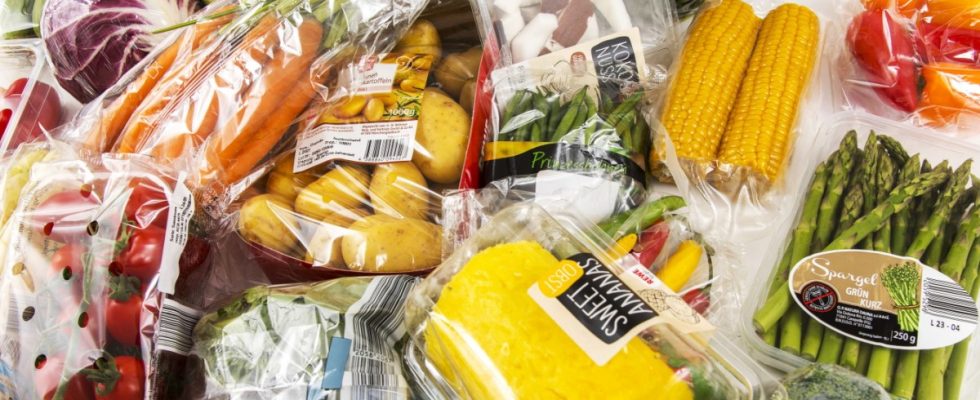A picture as you know it from the supermarket or discounter: four pears in a cardboard tray, also shrink-wrapped in plastic. The same with apples, yes, there are a few unpackaged, but most are shrink-wrapped or in a two-kilo plastic bag. Likewise carrots, onions or lemons.
The German Environmental Aid considers this packaging with plastic to be superfluous. Germany has a packaging and therefore a plastic problem. “We are the absolute front runners in Germany when it comes to the production of packaging waste,” says Barbara Metz, national director of the German Environmental Aid (DUH). Around 225 kilograms of packaging waste are generated in Germany per capita and year, which is well above the European average of almost 177 kilograms. Around 60 percent of this waste comes from private households.
The DUH presented the results of the second edition of its packaging check on Thursday. In 48 branches of the large supermarket and discounter chains, the environmentalists examined how they deal with the packaging. In addition to organic supermarkets such as Alnatura and Bio Company, the DUH examined supermarkets such as Edeka and Rewe and discounters such as Aldi Nord and Süd, Kaufland and Netto Markendiscount. Four “shopping cart-typical” product categories were examined: fruit and vegetables, beverages, milk and yoghurt as well as self-service and fresh food counters.
In summary, it can be said that only the organic supermarkets consistently use reusable packaging. Dairy products are also mainly offered there in disposable packaging, but Alnatura and the others achieved above-average results in the other three categories. While Edeka and Rewe are in the middle, the discounters fare particularly poorly. You cannot convince the DUH in all four areas. The worst results are achieved by Aldi Nord and Aldi Süd. They don’t offer reusable packaging at all.
The discounter Netto Markendiscounter, which belongs to the Edeka group, said it could not understand the DUH check. They try very hard to avoid plastic and work together with the nature conservation organization WWF. In addition, packaging served to protect, ensure the safety and hygiene of the goods. The discounters Aldi Nord and Aldi Süd, attacked by the DUH, find the study “one-sided”. Fruit and also meat and fish would be qualitatively more durable through packaging, so less food would be wasted. In addition, both discounters tried to avoid plastic packaging as much as possible and to replace it with sustainable or recycled materials. Incidentally, both are open to reusable drinks when it comes to drinks. Disposable and reusable have their “raison d’être” here and should be ecologically optimized by all those involved, from politics to industry.
Annika Oppermann, CEO of the reusable association, on the other hand, shows little understanding for disposable packaging. Reusable could be taken back to the retailer, cleaned and then refilled. This distinguishes reusable from disposable packaging, which also includes most returnable plastic bottles. Disposable packaging is recycled, but this is very energy-intensive. “Moreover, downcycling often takes place with such materials,” says Oppermann. So a recycling at a worse level. Usually only a small part of the recyclable materials can be reused as packaging material for food products.
In order to prevent such a waste of resources, Barbara Metz sees politics as a responsibility: “It’s not enough to do it voluntarily.” Binding specifications are needed, such as a waste avoidance target of 120 kilograms of waste per capita. In addition, the DUH calls for a plastic tax that will be passed on to responsible companies and a ban on thin plastic bags for fruit and vegetables.
Oppermann advocates a clear political framework. They must be attractive to companies and consumers. Reusable products are often more expensive than disposable products. Environmental damage, for example, is not priced in for disposable packaging. That has to change. “Accordingly, one-way is rather too cheap than reusable is too expensive.”
Nevertheless, Oppermann is optimistic. There are already concrete solutions, for example for soap and dishwashing liquid. She also sees good prospects for cooking oils, spreads, preserves and coffee. The food industry now needs pioneers who are willing to switch to reusable packaging. The organic supermarkets have shown in the packaging check that less packaging is also possible and practicable.

